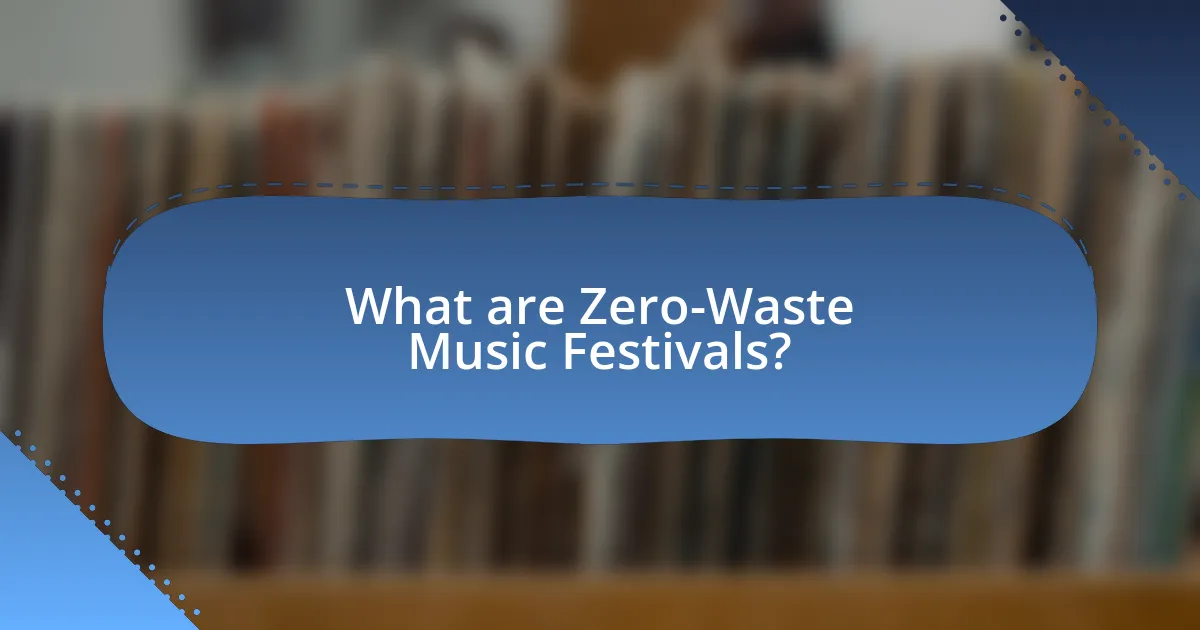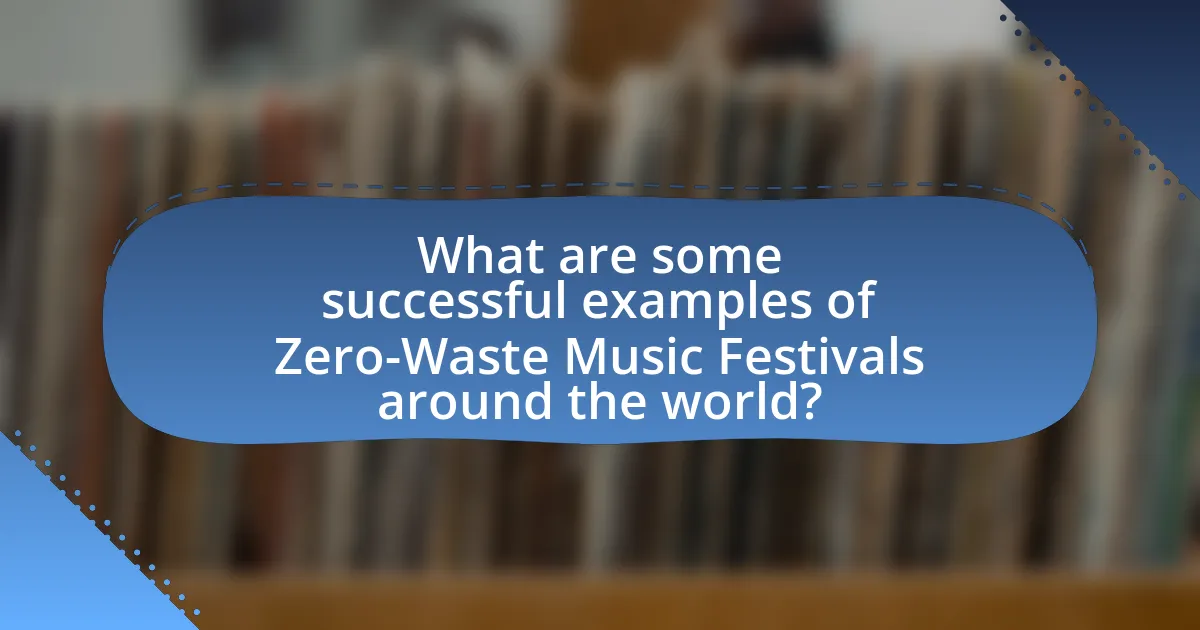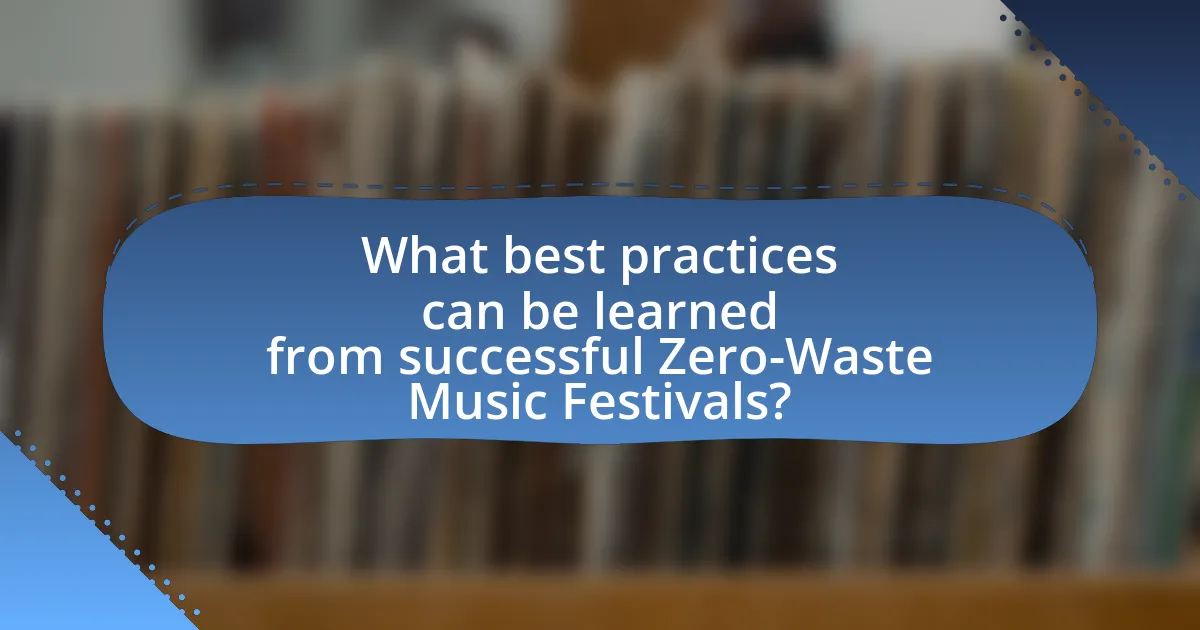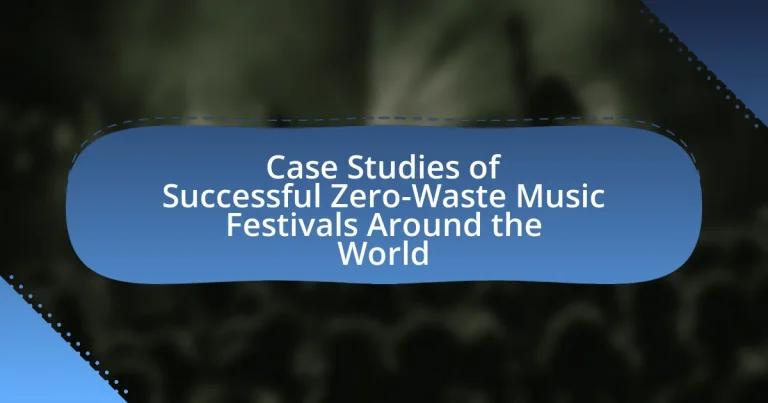Zero-Waste Music Festivals are events designed to minimize waste and promote sustainability through practices such as recycling, composting, and the use of reusable materials. This article examines successful case studies of Zero-Waste Music Festivals around the world, highlighting their strategies, goals, and the impact they have on local communities and the environment. Key examples include the Glastonbury Festival, which achieved a 50% reduction in landfill waste, and the Shambhala Music Festival, which has maintained a diversion rate of over 90%. The article also discusses the challenges these festivals face in achieving Zero-Waste status and offers practical tips for other events to implement similar sustainable practices.

What are Zero-Waste Music Festivals?
Zero-Waste Music Festivals are events designed to minimize waste generation and promote sustainability by implementing practices that ensure all materials used are either reused, recycled, or composted. These festivals often feature strategies such as providing reusable cups, encouraging attendees to bring their own containers, and setting up extensive recycling and composting stations. For instance, the 2019 Glastonbury Festival achieved a 50% reduction in waste sent to landfills by employing these zero-waste principles, demonstrating the effectiveness of such initiatives in large-scale events.
How do Zero-Waste Music Festivals differ from traditional festivals?
Zero-Waste Music Festivals differ from traditional festivals primarily in their commitment to eliminating waste through sustainable practices. While traditional festivals often generate significant amounts of trash, Zero-Waste Festivals implement strategies such as composting, recycling, and the use of reusable materials to minimize environmental impact. For instance, events like the Shambhala Music Festival have achieved over 90% waste diversion rates by providing extensive recycling and composting stations, demonstrating that effective waste management can significantly reduce landfill contributions.
What practices define a Zero-Waste Music Festival?
A Zero-Waste Music Festival is defined by practices that aim to eliminate waste through comprehensive recycling, composting, and sustainable resource management. These festivals implement strategies such as providing clearly marked recycling and composting stations, using biodegradable or reusable materials for food and beverage service, and encouraging attendees to bring their own reusable containers. Additionally, they often collaborate with local organizations to ensure proper waste diversion and educate attendees on sustainable practices. For example, the Shambhala Music Festival in Canada achieved a 95% waste diversion rate by employing these methods, demonstrating the effectiveness of a structured approach to waste management in large events.
Why is the concept of Zero-Waste important in the music industry?
The concept of Zero-Waste is important in the music industry because it significantly reduces environmental impact and promotes sustainability. Music festivals and events generate substantial waste, with studies indicating that large festivals can produce over 1,000 tons of waste each year. Implementing Zero-Waste practices, such as composting, recycling, and minimizing single-use plastics, helps mitigate this issue. For instance, the Glastonbury Festival has adopted a Zero-Waste goal, resulting in a 50% reduction in waste sent to landfills since 2019. This shift not only enhances the industry’s ecological responsibility but also sets a precedent for fans and other sectors to follow, fostering a culture of sustainability within the community.
What are the goals of Zero-Waste Music Festivals?
The goals of Zero-Waste Music Festivals are to minimize waste generation, promote recycling and composting, and educate attendees about sustainable practices. These festivals aim to achieve a closed-loop system where all materials are reused or recycled, significantly reducing landfill contributions. For instance, events like the Glastonbury Festival have implemented extensive waste management strategies, achieving a diversion rate of over 50% of waste from landfills through recycling and composting initiatives.
How do these festivals aim to reduce waste?
These festivals aim to reduce waste by implementing comprehensive waste management strategies that include recycling, composting, and the use of reusable materials. For instance, many festivals provide clearly marked recycling and compost bins throughout the venue, encouraging attendees to sort their waste properly. Additionally, some festivals partner with local organizations to ensure that food waste is composted, thereby diverting it from landfills. Evidence of effectiveness can be seen in festivals like Glastonbury, which reported a 50% reduction in waste sent to landfills by adopting these practices.
What impact do they have on local communities and the environment?
Zero-waste music festivals positively impact local communities and the environment by promoting sustainable practices and reducing waste. These festivals engage local residents through initiatives such as community clean-up events and educational workshops, fostering a sense of ownership and responsibility towards environmental stewardship. For instance, the Shambhala Music Festival in Canada has implemented a comprehensive waste diversion program, achieving a diversion rate of over 90%, which not only minimizes landfill contributions but also encourages attendees to adopt eco-friendly habits. Additionally, these festivals often support local economies by sourcing food and materials from nearby vendors, thereby enhancing community ties and economic resilience.

What are some successful examples of Zero-Waste Music Festivals around the world?
Some successful examples of Zero-Waste Music Festivals around the world include the Shambhala Music Festival in Canada, the Glastonbury Festival in the UK, and the Coachella Valley Music and Arts Festival in the USA. The Shambhala Music Festival has implemented a comprehensive waste management system that includes composting, recycling, and waste diversion strategies, achieving a diversion rate of over 90%. Glastonbury Festival has introduced a “Green Policy” that promotes reusable cups and extensive recycling programs, resulting in significant waste reduction. Coachella has adopted a zero-waste goal, utilizing composting and recycling initiatives that have led to a reported diversion of over 80% of waste from landfills. These festivals demonstrate effective practices in waste management and sustainability within the music festival industry.
Which festivals have achieved Zero-Waste status?
Several festivals have achieved Zero-Waste status, including the Glastonbury Festival, the Shambala Festival, and the Bonnaroo Music and Arts Festival. Glastonbury Festival, held in the UK, has implemented extensive recycling and composting programs, diverting over 50% of its waste from landfills. Shambala Festival, also in the UK, has been recognized for its commitment to sustainability, achieving a 100% diversion rate from landfill since 2013. Bonnaroo, located in the US, has adopted a comprehensive waste management strategy that includes recycling, composting, and waste reduction initiatives, leading to significant waste diversion. These festivals exemplify successful efforts in achieving Zero-Waste status through effective waste management practices.
What strategies did these festivals implement to reach Zero-Waste?
Festivals aiming for Zero-Waste implemented strategies such as comprehensive recycling and composting programs, the use of biodegradable materials, and the establishment of waste diversion stations. These initiatives ensure that waste is sorted correctly, with clear signage to guide attendees. For instance, festivals like Glastonbury have reported diverting over 50% of their waste from landfills through these methods. Additionally, some festivals introduced a “Bring Your Own” policy for containers and utensils, significantly reducing single-use plastics. These strategies collectively contribute to minimizing waste generation and promoting sustainable practices among festival-goers.
How do these festivals measure their waste reduction success?
Festivals measure their waste reduction success through various metrics, including waste diversion rates, total waste generated, and participant engagement in recycling and composting initiatives. For instance, many festivals track the percentage of waste diverted from landfills by calculating the amount of recyclable and compostable materials collected compared to the total waste produced. Additionally, some festivals conduct pre- and post-event surveys to assess attendee awareness and participation in waste reduction efforts, providing quantitative data on behavioral changes. This approach allows organizers to evaluate the effectiveness of their sustainability programs and make informed improvements for future events.
What challenges do festivals face in becoming Zero-Waste?
Festivals face significant challenges in becoming Zero-Waste, primarily due to logistical complexities, participant behavior, and infrastructure limitations. Logistical complexities include the need for comprehensive waste management systems that can effectively sort, recycle, and compost materials on-site, which requires substantial planning and resources. Participant behavior poses another challenge, as attendees may not adhere to waste separation guidelines, leading to contamination of recyclable materials. Infrastructure limitations, such as insufficient access to recycling facilities and composting services, further hinder the ability to achieve Zero-Waste goals. According to a study by the Green Music Initiative, festivals that implemented robust waste management strategies saw a reduction in waste sent to landfills by up to 70%, highlighting the importance of addressing these challenges to improve sustainability efforts.
What common obstacles hinder the transition to Zero-Waste?
Common obstacles that hinder the transition to Zero-Waste include lack of awareness, inadequate infrastructure, and resistance to change. Lack of awareness among consumers and event organizers leads to insufficient understanding of waste management practices, which is crucial for implementing Zero-Waste initiatives. Inadequate infrastructure, such as limited access to recycling and composting facilities, complicates waste diversion efforts. Resistance to change from stakeholders, including vendors and attendees, can also impede the adoption of sustainable practices, as they may be accustomed to traditional waste disposal methods. These factors collectively create significant challenges in achieving Zero-Waste goals at events like music festivals.
How can festivals overcome these challenges?
Festivals can overcome challenges by implementing comprehensive waste management strategies that prioritize recycling, composting, and reducing single-use plastics. For instance, successful zero-waste festivals, such as the Shambhala Music Festival in Canada, have achieved over 90% waste diversion rates by providing clearly labeled recycling and composting stations, educating attendees on waste sorting, and partnering with local organizations for waste collection and processing. These measures not only minimize landfill contributions but also foster a culture of sustainability among festival-goers, demonstrating that effective waste management can significantly enhance the environmental impact of large events.

What best practices can be learned from successful Zero-Waste Music Festivals?
Successful Zero-Waste Music Festivals implement several best practices that significantly reduce waste and promote sustainability. These festivals prioritize comprehensive waste management strategies, including extensive recycling and composting programs, which can divert up to 90% of waste from landfills, as evidenced by the 2019 Glastonbury Festival’s achievement of recycling 50% of its waste. Additionally, they encourage the use of reusable containers and provide incentives for attendees to bring their own, which has been shown to reduce single-use plastic consumption by over 70% at events like the Shambala Festival. Furthermore, successful festivals engage in community partnerships to source local food and products, minimizing transportation emissions and supporting local economies, as demonstrated by the 2018 Coachella Festival’s collaboration with local vendors. Lastly, educational campaigns that inform attendees about waste reduction practices have proven effective, with studies indicating that informed participants are 30% more likely to engage in sustainable behaviors during events.
How can other festivals implement Zero-Waste strategies?
Other festivals can implement Zero-Waste strategies by adopting comprehensive waste management plans that prioritize reduction, reuse, and recycling. For instance, festivals can conduct waste audits to identify the types and amounts of waste generated, allowing them to tailor their strategies effectively. Additionally, they can partner with local recycling and composting facilities to ensure proper waste diversion. Implementing a robust education campaign for attendees about waste sorting and the importance of sustainability can further enhance participation. Festivals like Glastonbury have successfully reduced waste by providing reusable cups and encouraging vendors to minimize packaging, demonstrating that practical measures can lead to significant waste reduction.
What role do vendors play in achieving Zero-Waste?
Vendors play a crucial role in achieving Zero-Waste by implementing sustainable practices in their operations. They contribute by minimizing single-use plastics, offering compostable or reusable packaging, and ensuring that all waste generated is properly sorted for recycling or composting. For instance, at the Zero-Waste Music Festival in San Francisco, vendors were required to use only compostable materials, which resulted in a diversion rate of over 90% of waste from landfills. This demonstrates that when vendors adopt eco-friendly practices, they significantly enhance the overall waste management efforts of the event, leading to successful Zero-Waste outcomes.
How can festival-goers contribute to a Zero-Waste environment?
Festival-goers can contribute to a Zero-Waste environment by actively participating in waste reduction practices such as using reusable containers, recycling, and composting. By bringing their own reusable water bottles, utensils, and bags, attendees minimize single-use plastics, which are a significant contributor to festival waste. Additionally, many festivals provide clearly marked recycling and composting stations, and by utilizing these, festival-goers help divert waste from landfills. Studies show that festivals implementing these practices can reduce waste by up to 90%, demonstrating the effectiveness of individual actions in achieving a Zero-Waste goal.
What are the long-term benefits of adopting Zero-Waste practices?
Adopting Zero-Waste practices leads to significant long-term benefits, including reduced environmental impact, cost savings, and enhanced community engagement. By minimizing waste, organizations can decrease landfill contributions, which in turn lowers greenhouse gas emissions and conserves natural resources. For instance, a study by the Ellen MacArthur Foundation found that transitioning to a circular economy, which aligns with Zero-Waste principles, could generate $4.5 trillion in economic benefits globally by 2030. Additionally, implementing these practices often results in lower operational costs due to reduced waste disposal fees and increased efficiency in resource use. Furthermore, Zero-Waste initiatives foster community involvement and awareness, encouraging sustainable behaviors among attendees and participants, as evidenced by successful case studies from music festivals that have adopted these practices, leading to a more environmentally conscious public.
How do Zero-Waste festivals influence sustainability in the music industry?
Zero-Waste festivals significantly influence sustainability in the music industry by implementing comprehensive waste management practices that minimize environmental impact. These festivals adopt strategies such as composting, recycling, and reducing single-use plastics, which collectively lead to a substantial decrease in waste generation. For instance, the 2019 Glastonbury Festival achieved a 50% reduction in waste sent to landfills by promoting reusable cups and providing extensive recycling facilities. This model encourages other festivals to adopt similar practices, fostering a culture of sustainability within the industry. Additionally, Zero-Waste festivals often serve as educational platforms, raising awareness among attendees about environmental issues and inspiring them to adopt sustainable behaviors in their daily lives.
What lessons can be applied to other events and industries?
Successful zero-waste music festivals demonstrate that comprehensive waste management strategies can be effectively implemented in various events and industries. For instance, the use of reusable materials, such as cups and plates, significantly reduces waste generation, as evidenced by the 2019 Glastonbury Festival, which diverted over 1,000 tons of waste from landfills through its recycling and composting initiatives. Additionally, engaging attendees in sustainability practices, like encouraging them to bring their own containers, fosters a culture of environmental responsibility that can be replicated in corporate events and community gatherings. Furthermore, partnerships with local organizations for waste collection and education enhance community involvement and resource efficiency, as seen in the case of the Shambala Festival, which achieved a 95% waste diversion rate. These lessons highlight the importance of proactive planning, community engagement, and innovative waste solutions that can be adapted across various sectors.
What practical tips can festivals use to become Zero-Waste?
Festivals can become Zero-Waste by implementing strategies such as providing reusable containers, establishing comprehensive recycling and composting stations, and partnering with vendors who prioritize sustainable practices. Reusable containers reduce single-use plastics, which account for a significant portion of festival waste. Comprehensive recycling and composting stations ensure that waste is properly sorted, as studies show that effective waste management can divert up to 90% of waste from landfills. Partnering with vendors who use biodegradable materials and minimize packaging further supports a Zero-Waste goal, as evidenced by festivals like Glastonbury, which reported a 50% reduction in waste through such initiatives.


